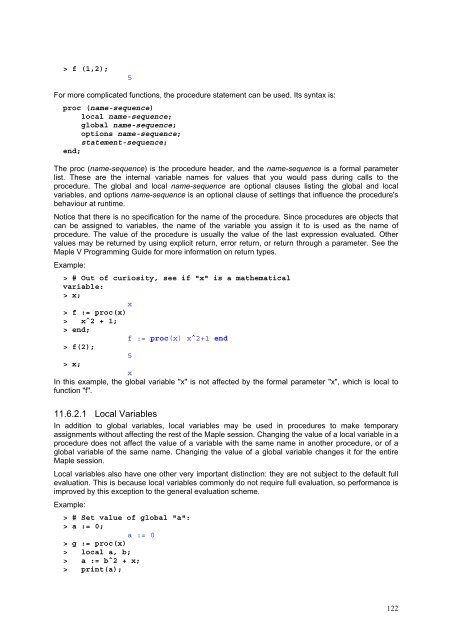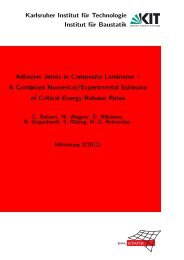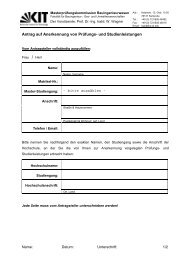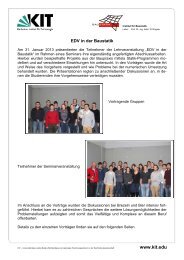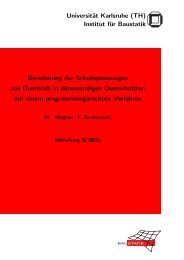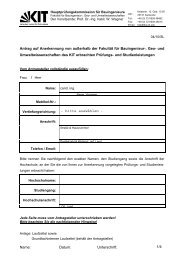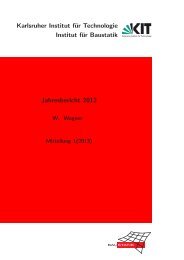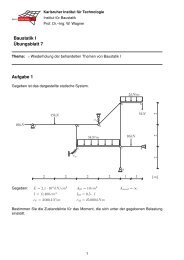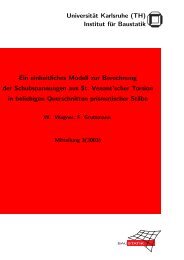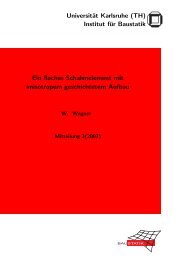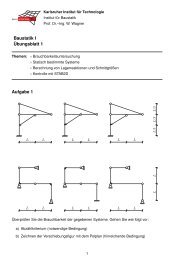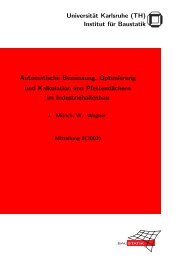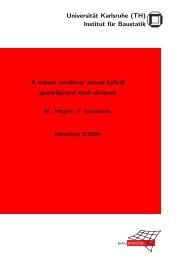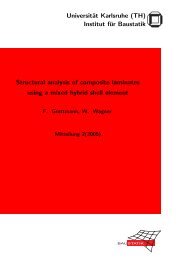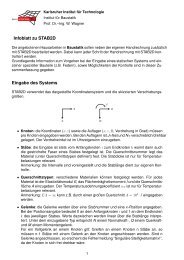PDF-Version - am Institut für Baustatik
PDF-Version - am Institut für Baustatik
PDF-Version - am Institut für Baustatik
Sie wollen auch ein ePaper? Erhöhen Sie die Reichweite Ihrer Titel.
YUMPU macht aus Druck-PDFs automatisch weboptimierte ePaper, die Google liebt.
f (1,2);<br />
5<br />
For more complicated functions, the procedure statement can be used. Its syntax is:<br />
proc (n<strong>am</strong>e-sequence)<br />
local n<strong>am</strong>e-sequence;<br />
global n<strong>am</strong>e-sequence;<br />
options n<strong>am</strong>e-sequence;<br />
statement-sequence;<br />
end;<br />
The proc (n<strong>am</strong>e-sequence) is the procedure header, and the n<strong>am</strong>e-sequence is a formal par<strong>am</strong>eter<br />
list. These are the internal variable n<strong>am</strong>es for values that you would pass during calls to the<br />
procedure. The global and local n<strong>am</strong>e-sequence are optional clauses listing the global and local<br />
variables, and options n<strong>am</strong>e-sequence is an optional clause of settings that influence the procedure's<br />
behaviour at runtime.<br />
Notice that there is no specification for the n<strong>am</strong>e of the procedure. Since procedures are objects that<br />
can be assigned to variables, the n<strong>am</strong>e of the variable you assign it to is used as the n<strong>am</strong>e of<br />
procedure. The value of the procedure is usually the value of the last expression evaluated. Other<br />
values may be returned by using explicit return, error return, or return through a par<strong>am</strong>eter. See the<br />
Maple V Progr<strong>am</strong>ming Guide for more information on return types.<br />
Ex<strong>am</strong>ple:<br />
> # Out of curiosity, see if "x" is a mathematical<br />
variable:<br />
> x;<br />
x<br />
> f := proc(x)<br />
> x^2 + 1;<br />
> end;<br />
f := proc(x) x^2+1 end<br />
> f(2);<br />
5<br />
> x;<br />
x<br />
In this ex<strong>am</strong>ple, the global variable "x" is not affected by the formal par<strong>am</strong>eter "x", which is local to<br />
function "f".<br />
11.6.2.1 Local Variables<br />
In addition to global variables, local variables may be used in procedures to make temporary<br />
assignments without affecting the rest of the Maple session. Changing the value of a local variable in a<br />
procedure does not affect the value of a variable with the s<strong>am</strong>e n<strong>am</strong>e in another procedure, or of a<br />
global variable of the s<strong>am</strong>e n<strong>am</strong>e. Changing the value of a global variable changes it for the entire<br />
Maple session.<br />
Local variables also have one other very important distinction: they are not subject to the default full<br />
evaluation. This is because local variables commonly do not require full evaluation, so performance is<br />
improved by this exception to the general evaluation scheme.<br />
Ex<strong>am</strong>ple:<br />
> # Set value of global "a":<br />
> a := 0;<br />
a := 0<br />
> g := proc(x)<br />
> local a, b;<br />
> a := b^2 + x;<br />
> print(a);<br />
122


